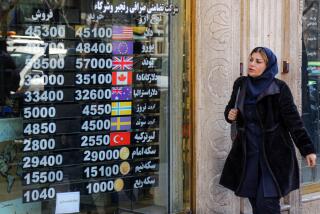Prospect of Chinese Takeover Prompts Brain Drain From Hong Kong
- Share via
HONG KONG — With Chinese rule nine years off, many of Hong Kong’s brightest people are moving overseas. Local leaders are growing increasingly concerned.
Immigration visa applications are up sharply and businesses report a rise in the number of professionals resigning to emigrate before 1997, when this British colony reverts to Chinese sovereignty and rule from Beijing.
“No one knows quite how extensive the problem is, but it’s certainly a problem,” said Jimmy D. McGregor, director of the Hong Kong General Chamber of Commerce. “As 1997 approaches, this problem becomes more acute.”
To a large degree, he added, “it’s the perception of China which is causing people to make that decision to go.”
Hong Kong, a capitalistic speck on China’s southeastern coast, enjoys one of Asia’s highest standards of living.
The Communist government in Beijing has promised that the territory can retain its capitalist system for 50 years after 1997 and enjoy a “high degree of autonomy.”
But a high percentage of Hong Kong’s 5.7 million people are refugees from China, and many are skeptical about Beijing’s promises.
A recent poll by Survey Research Hong Kong, an independent market research company, indicated that one-fifth of Hong Kong’s 1.5 million families have at least one member with foreign residency rights or with the intent to obtain such rights from other countries.
Many of the people planning to leave are skilled professionals and business executives; companies are noticing increased emigration among top-level employees.
“The problem area is in the executive level,” said Michael Broadbent, spokesman for the Hong Kong and Shanghai Bank, the colony’s premier bank. About 8% of the bank’s 670 locally hired executives resigned to emigrate last year, contrasted with 3% the year before, he said.
“Yes, we are concerned about it. No, we are not unduly alarmed,” he said. “Nobody likes to lose qualified people who you’ve invested a lot of time and money in training.”
The California-based Bank of America also has noticed a significant rise in emigration among top-level employees in Hong Kong, even though it is boosting wages and increasing training costs, said Senior Vice President Stephen B. Hunt. “The issue of turnover is becoming a significant issue in our business.”
Joseph Y. S. Cheng, a political analyst at Chinese University of Hong Kong, said that when his friends in their 30s and 40s “look around at their friends, they can hardly find any people who are determined to stay.”
“They discover that every friend has already secured a passport, is about to do so or is in the process of doing so,” Cheng said.
The colonial government does not keep emigration statistics. Although Hong Kong people have a history of resettling overseas, several indicators show the exodus is increasing.
Last year, 53,471 people, or nearly 1% of the population, applied for a police document certifying that the holder has no criminal record, an increase of 50% from 1986. The document is required by many countries to obtain visas.
Statistics from the Australian, Canadian and U.S. consulates indicate that 1987 visa applications were well above previous year levels, in many cases because of expanded immigration programs for people with money or professional skills.
The exodus is causing enough concern that local organizations are offering a seminar in April on “how to turn the emigration exodus to your advantage” and how to “create the incentive to stay.”
Top government officials have expressed concern about the emigration rates but argue that many people will return to Hong Kong once they have obtained a foreign passport.
They claim that many people seek foreign passports primarily as insurance for after the Chinese take over and estimate that as many as 8,000 people returned to Hong Kong in 1986 after obtaining residency rights in other countries.
But among the well-educated Hong Kong Chinese holding foreign passports are those who plan to remain in the colony just long enough to make money before the Chinese take over.
More to Read
Sign up for Essential California
The most important California stories and recommendations in your inbox every morning.
You may occasionally receive promotional content from the Los Angeles Times.










